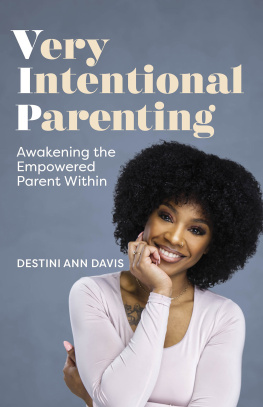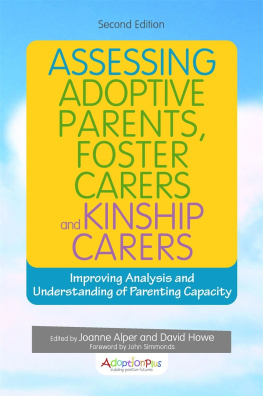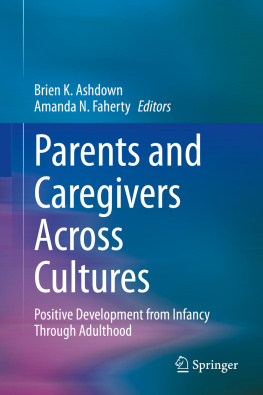
Assessing Culturally Informed Parenting in Social Work
This book explores how social workers incorporate issues of culture when evaluating the parenting competence of Black, Asian, and Minority Ethnic (BAME) parents and highlights the gap in how social workers assess safe parenting in BAME families.
Drawing on a study that combined a phenomenological research philosophy with frame analysis, the book explores how culturally informed parenting is construed by social workers and BAME parents. It argues that effective assessment of the parenting competence of BAME parents is predicated on understanding how culture frames perspectives of what constitutes competent parenting. Throughout the eight chapters, the book moves the debate within the literature away from the universality of parenting concepts to a focus on a deeper understanding of culture. It highlights the influence that culture has on the way that BAME parents socialise their children, as well as how parents and social workers conceptualise safe parenting. The result is useful insights into the cultural context of parenting.
The book will be of interest to all scholars and students of social work, childhood studies, sociology, and social policy, as well as social work professionals more broadly.
Davis Kiima is Senior Social Worker at Bexley Council, UK. He has a PhD in social work and social policy from the University of York, UK.
Routledge Advances in Social Work
Challenges, Opportunities and Innovations in Social Work Field Education
Edited by Ronnie Egan, Nicole Hill and Wendy Rollins
The Challenge of Nationalist Populism for Social Work
A Human Rights Approach
Edited by Carolyn Noble and Goetz Ottmann
Reforming Child Welfare in the Post-Soviet Space
Institutional Change in Russia
Meri Kulmala, Maija Jppinen, Anna Tarasenko and Anna Pivovarova
Women, Vulnerabilities and Welfare Service Systems
Edited by Marjo Kuronen, Elina Virokannas and Ulla Salovaara
Post-Anthropocentric Social Work
Critical Posthuman and New Materialist Perspectives
Edited by Vivienne Bozalek and Bob Pease
Rights-Based Community Practice and Academic Activism in a Turbulent World
Putting Theory into Practice in Israel, Palestine and Jordan
Jim Torczyner
Social Work, Young Migrants and the Act of Listening
Becoming an Unaccompanied Child
Marcus Herz and Philip Lalander
Assessing Culturally Informed Parenting in Social Work
Davis Kiima
For more information about this series, please visit: www.routledge.com/Routledge-Advances-in-Social-Work/book-series/RASW
First published 2021
by Routledge
2 Park Square, Milton Park, Abingdon, Oxon OX14 4RN
and by Routledge
52 Vanderbilt Avenue, New York, NY 10017
Routledge is an imprint of the Taylor & Francis Group, an informa business
2021 Davis Kiima
The right of Davis Kiima to be identified as author of this work has been asserted by him in accordance with sections 77 and 78 of the Copyright, Designs and Patents Act 1988.
All rights reserved. No part of this book may be reprinted or reproduced or utilised in any form or by any electronic, mechanical, or other means, now known or hereafter invented, including photocopying and recording, or in any information storage or retrieval system, without permission in writing from the publishers.
Trademark notice: Product or corporate names may be trademarks or registered trademarks, and are used only for identification and explanation without intent to infringe.
British Library Cataloguing-in-Publication Data
A catalogue record for this book is available from the British Library
Library of Congress Cataloging-in-Publication Data
Names: Kiima, Davis, author.
Title: Assessing culturally informed parenting in social work / Davis Kiima.
Description: New York : Routledge, 2021. | Series: Routledge advances in
social work | Includes bibliographical references and index.
Identifiers: LCCN 2020039879 (print) | LCCN 2020039880 (ebook) |
ISBN 9780367543839 (hardback) | ISBN 9781003089049 (ebook)
Subjects: LCSH: Social service. | ParentingSocial aspects. |
Multiculturalism. | Intercultural communication.
Classification: LCC HV40 .K443 2021 (print) | LCC HV40 (ebook) |
DDC 362.82/53dc23
LC record available at https://lccn.loc.gov/2020039879
LC ebook record available at https://lccn.loc.gov/2020039880
ISBN: 978-0-367-54383-9 (hbk)
ISBN: 978-1-003-08904-9 (ebk)
Typeset in Times New Roman
by Apex CoVantage, LLC
Introduction
Social workers, academics, and policy makers in the United Kingdom (UK) have long grappled with understanding why Black, Asian, and Minority Ethnic (BAME) children are disproportionally represented in safeguarding statistics. Although regional figures do not cohere, national data indicate that they are over-represented. The literature proposes myriad explanations for this. Some say that it is the result of factors such as poverty (Gupta and Blewett, 2008; Saar-Heiman and Gupta, 2019), education (Race Disparity Audit, 2017), racism (Kriz and Skivenes, 2010; McGregor-Smith, 2017), immigration (Berrie and Mendes, 2011), and culture (Featherstone et al, 2014, Bradshaw, 2016; Berrie and Mendes, 2011), as well as how social workers communicate with families (Koprowska, 2014).
Despite the myriad explanations, consensus is that no single factor can independently explain the disproportionality. Comprehending it is further complicated by the aftermath of events such as the London Bombings of 7 July 2005, the UKs exit from the European Union (EU) in 2019, the coronavirus pandemic in 2020, and the resurgent Black Lives Matter campaigns of 2020. The wake of such events often emphasises the unequal distribution of social power and contributes to the stigmatising experiences of BAME families. According to some BAME parents, how professionals respond following such events can inadvertently perpetuate social stigma.
In this book, I argue that the disproportional representation of BAME children in safeguarding statistics is associated with how culturally informed parenting is assessed. This is not to suggest that other socioeconomic factors have no credence. The point I make is that social workers who interpret the influence of socioeconomic factors outside BAME families cultural contexts are likely to misunderstand parenting practices and draw inaccurate conclusions about childrens safety. Equally, social workers who are oblivious about how their own worldview and cultural backgrounds impact their practice are susceptible to inflexibility when assessing culturally informed parenting.
The notion that inaccurate evaluations of BAME childrens safety within their families contribute to disproportional representation is well documented within the literature. This book, therefore, seeks to achieve three main goals: first, to add a voice to a growing body of literature, which recognises that BAME parents have less social power compared to their White counterparts; second, to highlight how assessing social workers inadvertently stymie opportunities for BAME children to remain in the care of their birth families; and third, to explore how to enhance social workers abilities to interpret the meanings of the different parenting practices that they encounter when assessing BAME families.









